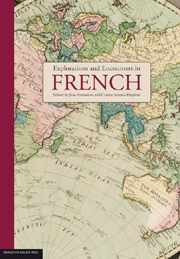Book contents
- Frontmatter
- Contents
- Foreword and Acknowledgements
- Expressions of Support
- Editors' Note
- Encountering French and the French
- Explorations and Encounters: On the Uses of a Theme
- Le choc des discours dans la presse française: de la crise des banlieues à celle des universités (novembre 2005, mars 2006)
- Comment j'ai appris la littérature: morceaux choisis d'une éducation
- Historical Explorations
- Intercultural Encounters
- Explorations in the Classroom
- Table of Illustrations
- Appendix 1 Conference History
- Appendix 2 Contents of the CD-ROM
Explorations and Encounters: On the Uses of a Theme
from Encountering French and the French
Published online by Cambridge University Press: 05 June 2012
- Frontmatter
- Contents
- Foreword and Acknowledgements
- Expressions of Support
- Editors' Note
- Encountering French and the French
- Explorations and Encounters: On the Uses of a Theme
- Le choc des discours dans la presse française: de la crise des banlieues à celle des universités (novembre 2005, mars 2006)
- Comment j'ai appris la littérature: morceaux choisis d'une éducation
- Historical Explorations
- Intercultural Encounters
- Explorations in the Classroom
- Table of Illustrations
- Appendix 1 Conference History
- Appendix 2 Contents of the CD-ROM
Summary
“We shall not cease from exploration
And the end of all our exploring
Will be to arrive where we started.
And know the place for the very first time.”
T. S. Eliot, “Little Gidding”The theme of exploration requires little explanation in terms of its relevance to the constant strivings of human life and, by extension, to the activities of learning and scholarship; indeed, with its corollary of the journey, it underlines, as do writings since time immemorial, including many a school motto, the intimate relationship between seeking and discovering; striving and finding; quest and knowledge. The title of this volume – Explorations and Encounters in French – can therefore be seen as self-evident, announcing as it does its essentially investigative nature and its position within a field of study. However, if the title immediately announces a collective endeavour, it also taps into a set of deeper connections, the connections that bind all of those who form part of the community of French teachers and scholars in Australia and abroad. Laying bare those connections did, nonetheless, prove to be a task that was perhaps more challenging than meets the eye.
Firstly, it would be surprizing if French teachers and researchers in every branch of the education sector were to adhere to the concept of a collective identity, so large has become the number of research fields and curriculum choices within the discipline.
- Type
- Chapter
- Information
- Explorations and Encounters in French , pp. 21 - 34Publisher: The University of Adelaide PressPrint publication year: 2010



